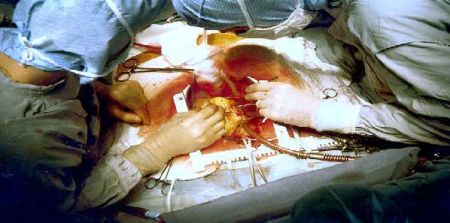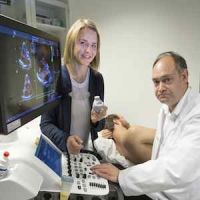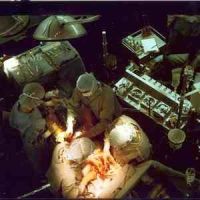Aiming to improve public awareness and understanding of cardiothoracic surgical outcomes, The Society of Thoracic Surgeons (STS) has released the first publicly accessible national report of surgical outcomes from its Congenital Heart Surgery Database (CHSD). The CHSD is a component of the STS National Database, which is widely considered the gold standard for a medical specialty clinical outcomes database. Public reporting results are available at www.sts.org/publicreporting.
The CHSD, the largest database in North America focused exclusively on paediatric and congenital cardiac malformations, accounts for more than 95 percent of all hospitals in the United States that perform paediatric heart surgery.
"This is the first time ever that paediatric and congenital heart surgery outcomes in the United States have been made available to the public on a national level,” says Jeffrey P. Jacobs, MD, chair of the STS Public Reporting Task Force and professor of surgery at The Johns Hopkins University. “STS has always been a strong advocate of transparency within the specialty. We believe that our patients and their families have the right to know the outcomes of cardiothoracic surgery procedures so that they can make well-informed decisions.”
For the first round of STS Public Reporting Online from the CHSD, 25 sites (22.7 percent) participated, which closely resembles the level of participation in the first round of public reporting from the STS Adult Cardiac Surgery Database (ACSD) that began five years ago. ACSD participation is now at 42.7 percent (453 sites).
For the CHSD participants who reported surgical data, STS released four-year observed, expected, and risk-adjusted centre-level operative mortality rates for the aggregate of all patients, as well as for patients stratified on the basis of the five STAT Mortality Categories (surgical procedures grouped by complexity). Outcomes have been risk-adjusted to take into account procedural complexity and individual patient factors such as age, weight, previous surgeries, preoperative co-morbidities, non-cardiac abnormalities (including chromosomal abnormalities), and other medical conditions that could affect results.
As Marshall L. Jacobs, MD, chair of the STS CHSD Task Force, points out: “As paediatric and congenital cardiac surgeons, we perform operations on patients born with a wide variety of heart defects of varying complexity, and many patients have additional risk factors. Adjusting for these risk factors allows us to better understand reported mortality rates, especially for centres that operate on the most challenging patients.”
While the ACSD includes a star-ratings system to report hospital outcomes, star ratings are not currently reported for the CHSD. Star ratings, based on a hospital’s overall risk-adjusted observed-to-expected operative mortality ratio, will be added to the summer 2015 release.
“Public access to outcomes data for adult heart surgery and now paediatric and congenital heart surgery is at an unprecedented level and will continue to increase,” Dr. Jacobs notes. “Next year, we plan to add public reporting for STS General Thoracic Surgery Database participants, starting with outcomes for lobectomy in cancer patients.”
To access the CHSD outcomes directly, visit www.sts.org/congenital-public-reporting-module-search.
Source: Society of Thoracic Surgeons
Image Credit: Wikimedia Commons
The CHSD, the largest database in North America focused exclusively on paediatric and congenital cardiac malformations, accounts for more than 95 percent of all hospitals in the United States that perform paediatric heart surgery.
"This is the first time ever that paediatric and congenital heart surgery outcomes in the United States have been made available to the public on a national level,” says Jeffrey P. Jacobs, MD, chair of the STS Public Reporting Task Force and professor of surgery at The Johns Hopkins University. “STS has always been a strong advocate of transparency within the specialty. We believe that our patients and their families have the right to know the outcomes of cardiothoracic surgery procedures so that they can make well-informed decisions.”
For the first round of STS Public Reporting Online from the CHSD, 25 sites (22.7 percent) participated, which closely resembles the level of participation in the first round of public reporting from the STS Adult Cardiac Surgery Database (ACSD) that began five years ago. ACSD participation is now at 42.7 percent (453 sites).
For the CHSD participants who reported surgical data, STS released four-year observed, expected, and risk-adjusted centre-level operative mortality rates for the aggregate of all patients, as well as for patients stratified on the basis of the five STAT Mortality Categories (surgical procedures grouped by complexity). Outcomes have been risk-adjusted to take into account procedural complexity and individual patient factors such as age, weight, previous surgeries, preoperative co-morbidities, non-cardiac abnormalities (including chromosomal abnormalities), and other medical conditions that could affect results.
As Marshall L. Jacobs, MD, chair of the STS CHSD Task Force, points out: “As paediatric and congenital cardiac surgeons, we perform operations on patients born with a wide variety of heart defects of varying complexity, and many patients have additional risk factors. Adjusting for these risk factors allows us to better understand reported mortality rates, especially for centres that operate on the most challenging patients.”
While the ACSD includes a star-ratings system to report hospital outcomes, star ratings are not currently reported for the CHSD. Star ratings, based on a hospital’s overall risk-adjusted observed-to-expected operative mortality ratio, will be added to the summer 2015 release.
“Public access to outcomes data for adult heart surgery and now paediatric and congenital heart surgery is at an unprecedented level and will continue to increase,” Dr. Jacobs notes. “Next year, we plan to add public reporting for STS General Thoracic Surgery Database participants, starting with outcomes for lobectomy in cancer patients.”
To access the CHSD outcomes directly, visit www.sts.org/congenital-public-reporting-module-search.
Source: Society of Thoracic Surgeons
Image Credit: Wikimedia Commons
Latest Articles
heart surgery, paediatric, cardiothoracic, co-morbidity, congenital, preoperative
Aiming to improve public awareness and understanding of cardiothoracic surgical outcomes, The Society of Thoracic Surgeons (STS) has released the first pub...



























